Which Books Should You Be Reading This Week? Nov 26/27
Hmmm…. what to write about this week? Anyone want to hear about the story of Liz Truss? Out of the Blue, her biography is out thi— nah, thought not.
Many of the newspapers were busy compiling their best of 2022 lists this weekend, but wait, it’s still November, I don’t know about you but I don’t feel ready for Christmas let alone waving goodbye to 2022.
Well, we’ll come to that a bit further down, but in more tales from The Book Room, this week I have once again been in equal parts impressed and grateful for the number of customers coming into the shop to order their Christmas presents. One man was so absolutely determined to steer himself away from that website rhyming with ‘schlamadon’ that he completed his entire Christmas shopping list locally and just has one or two items he needs to go up to London to pick up. But he has done it all without any of those fake-happy cardboard boxes arriving at his house.
Another lady came in this weekend with a list What’s App’d to her by a teenager – all ‘schlamadon’ of course – but was adamant she would rather order from me, a little independent, and I actually happened to have two out of the three books in stock (it’s comforting for me to know I’m so down with the kids).
So, speaking of eschewing internet shopping, I thought you might be rather interested in our first book this week, Chokepoint Capitalism: How Big Tech and Big Content Captured Creative Labour Markets and How We’ll Win Them Back – try saying that after a few pre-Christmas Baileys!
The review in The Guardian starts off reminding us of the time that Prince wrote the word ‘slave’ on his cheek in protest that he was unable to escape the management contract he had signed at the aged of 18 basically owning him and his creative output for the rest of his life, and in this book, the authors Rebecca Giblin and Cory Doctorow, explore this idea that every artist working today is in fact a bond servant.
“Culture is the bait adverts are sold around,” writes Kitty Drake reviewing, “but artists see almost nothing of the billions Google, Facebook and Apple make off their backs. We have entered a new era of “chokepoint capitalism”, in which businesses snake their way between audiences and creatives to harvest money that should rightfully belong to the artist.
“An early chapter sketches the growth of Amazon, a relatively straightforward example of the phenomenon. First the company got publishers hooked on its site by offering them great rates. Once it become apparent they couldn’t survive without it, Amazon reduced their cut of the cover price.”
And that is just one example, and perhaps part of the reason that your friend here writing a newsletter finds it tougher than ever to make a living as a writer – as I know many of my writer friends do – because profits are squeezed and squeezed in all creative industries and it is correct that it is not the artists themselves who are enjoying the spoils of this.
“There is just one pipeline through which authors can access their readers,” the review continues, “and Amazon is squeezing it, dictating exactly which books make it to the other side, and at what price.
“The authors [of this book] remind us, repeatedly, that our own ignorance is being weaponised against us. If we don’t understand how big business established its chokehold over us, how will we ever be able to wriggle free of its grip?”
The book goes on to show how corporations have done this in every creative industry, so we can be more alert to letting them get away with it, and the second half of the book offers solutions on how to do this.
But any of these solutions start with a singular act – that customer of mine determined to shop locally, the other customer ignoring the temptation to click on the Amazon links the teenager sent her. The butterfly effect of these individual acts have more power that you realise at the time of making them.
Let’s all keep on trying in our small ways.
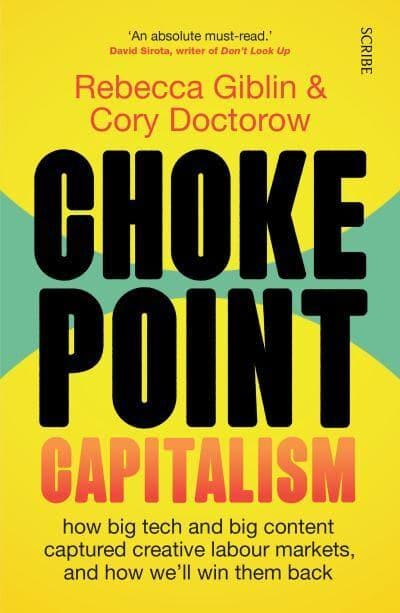
• Chokepoint Capitalism: How Big Tech and Big Content Captured Creative Labour Markets and How We’ll Win Them Back by Rebecca Giblin and Cory Doctorow (Scribe) £10.99
Luke Harding has attempted to do that in his book Invasion: The Inside Story of Russia’s Bloody War and Ukraine’s Fight for Survival.
I don’t know about you, but unless you are well-read on the topic of war, I find it hard to get to grips with some of these topics, but Harding’s book sounds as if it is easily accessible to those of us with an interest and concern for current affairs and yet not the expertise for military history.
“Luke Harding thinks carefully about how Putin’s Kremlin got itself into this mess,“ writes Michael Clarke reviewing for The Guardian. “Defence minister Sergei Shoigu – not a day in the military, though he wears a courtesy uniform – is one of Putin’s old hiking friends and more instrumental than most in recasting Russian history into a romantic fantasy. Putin didn’t need much encouragement to rewrite the story in his own mind.”
Oh, the decisions we make when in love with our own images of empire, I’m pleased to hear that it’s not just us Brits who are guilty of that, though devastated for those who are the bloody victims of these particular fantasies.
It would be easy, as I said at the beginning of this section, for Harding’s book to feel out of date already, but Clarke insists that it feels as contemporary as it can be while the war is still raging.
“Journalism, it has been said for the last 80 years,” he reflects, “‘is the first rough draft of history’. Harding’s account is a very good first historical draft, and it’s really not so rough. His judgments will last – and, sadly, they will be relevant for a long time to come.”
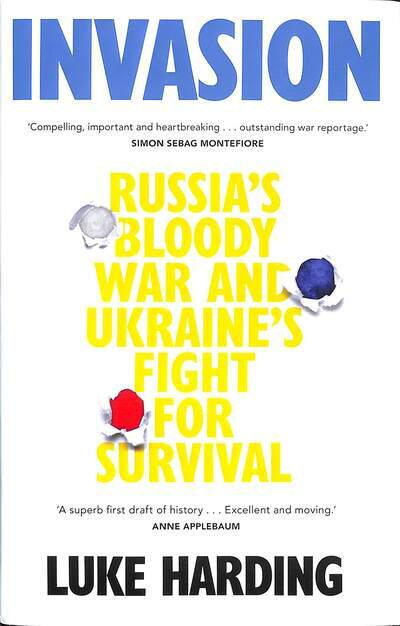
• Invasion: The Inside Story of Russia’s Bloody War and Ukraine’s Fight for Survival by Luke Harding (Guardian Faber) £20
Jimi is billed as a visual celebration of the artist who died at the age of just 27 and is a collaboration between his sister, Janie, and John McDermott of Experience Hendrix. It’s a 300+ page book made up of mostly pictures of the great man ranging him his childhood to some of his most famous stage appearances. Here’s what the Daily Mail had to say about it: “Though his mainstream music career lasted just four years, Jimi Hendrix left an indelible stamp on the world. Despite not being able to read or write music, the Rock & Roll Hall Of Fame describes him as ‘arguably the greatest instrumentalist in the history of rock music‘. Even now, decades after his untimely death at 27, he enjoys great success. His annual album sales today exceed those the guitarist enjoyed in his lifetime. He refused to be categorised, saying: ‘I hate to be in any type of compartment unless I choose it myself. They don’t get me in any cellophane cage. Nobody cages me.’“
Ok, ok, not really a review of the book, more of the man himself. Maybe I just wanted an excuse to put Jimi in this weekend’s digest.
Here’s what the publishers have to say about it: “JIMI significantly expands on the authors’ previously published titles, including An Illustrated Experience, and features a new introduction by Janie, extensive biographical texts, and a trove of lesser known and never-before-published photographs, personal memorabilia, lyrics, and more. Additionally, JIMI includes quotations by legendary musicians, such as Paul McCartney, Ron Wood, Jeff Beck, Lenny Kravitz, Drake, Dave Grohl, and others who have spoken about Hendrix’s lasting influence.”
I now have a Highway Chile earworm and that’s just fine.
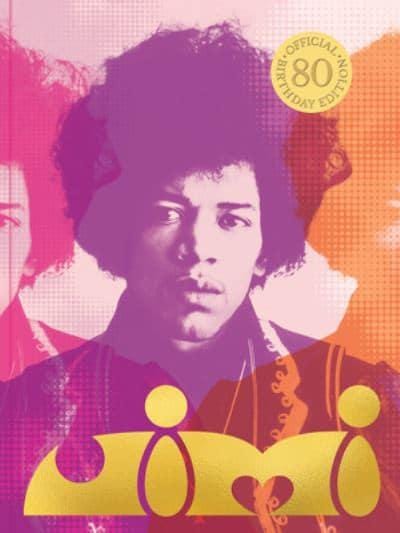
• Jimi by Janie Hendrix and John McDermott (Chronicle Books) £40
I finished at the shop last night at 5pm, and went home, collapsed on the sofa watching Lucy Worsley’s new BBC series on Agatha Christie and promptly fell asleep an hour later. Now, that’s not the greatest advert for it, but I have read Lucy’s new book Agatha Christie: A Very Elusive Woman and can confirm that the author she concerns herself with had a life almost as fascinating as the plots in her novels.
The Times has declared it one of their best literary non-fiction books of 2022:
“Christie was flabberghastingly prolific, but Worsley is undaunted, tracing biographical details through the fiction and illuminating “Christie tricks” (things hidden in plain sight; concealed romances). A smart and highly entertaining portrait of a literary powerhouse,” says the reviewer.
It would make a wonderful Christmas present for any Christie fan.
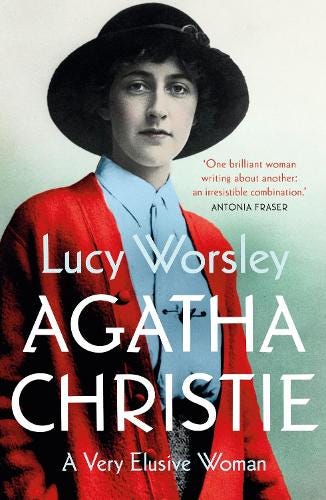
• Agatha Christie: A Very Elusive Woman by Lucy Worsley (Hodder & Stoughton) £25
And so, while going through the newspaper reviews, my eye was drawn to The Times’ best poetry books of the year, and this next book was decreed best anthology.
More Fiya edited by Kayo Chingonyi is a new collection of Black British Poetry, and this is why The Times loved it: “Black British poets are having an ever-greater impact on the UK’s poetry landscape. More Fiya is a showcase – in 34 writers – of their brilliance. We know that poets such as Roger Robinson and Rachel Long are among our very best, but also here are the best poems from recent debuts by Denise Saul, Warsan Shire and Yomi Sode. Kayo Chingonyi’s introduction is amusingly ‘me me me’, but his celebratory selection here has something for everyone.”
This book definitely sounds worth checking out.
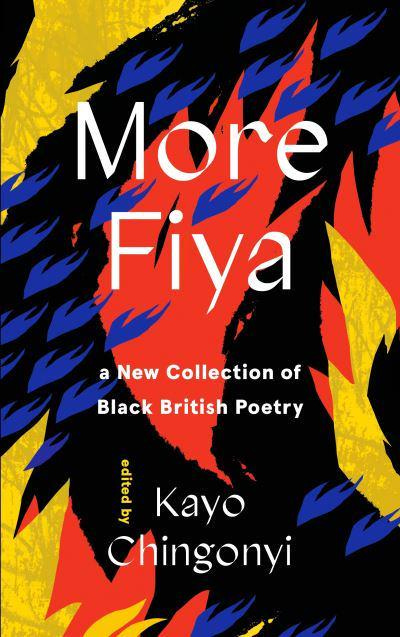
• More Fiya edited by Kayo Chingonyi (Canongate) £16.99
Just before I sign off, I hope you enjoy these weekly digests, do let me know, and a reminder from me that you can order all or any of these books from me, in fact, I would love you to. You can contact me here: hello@thebookroom.uk
Until next week!
Anna




